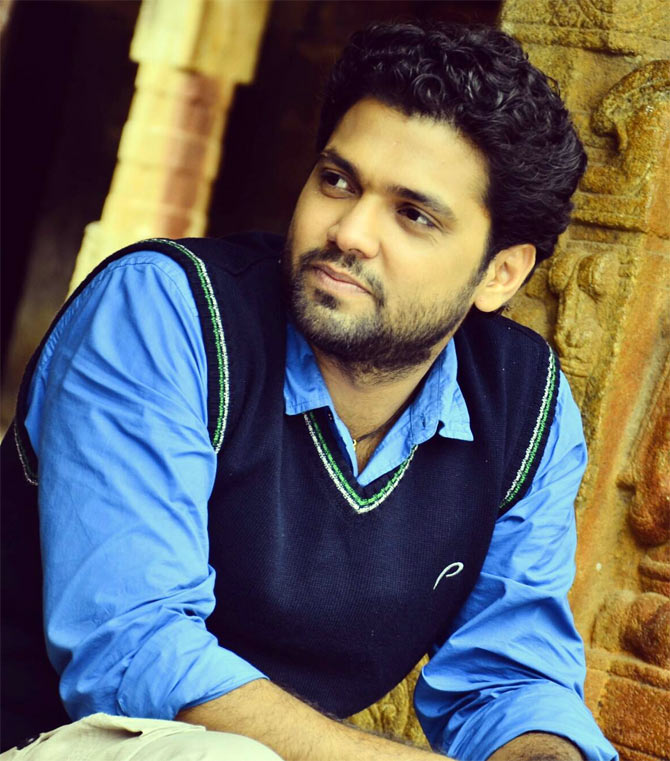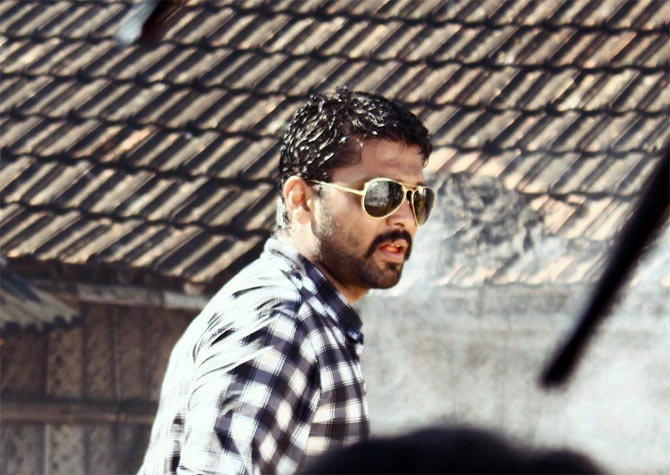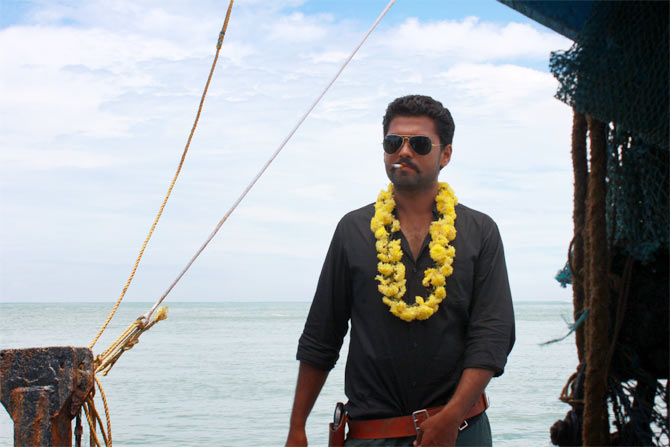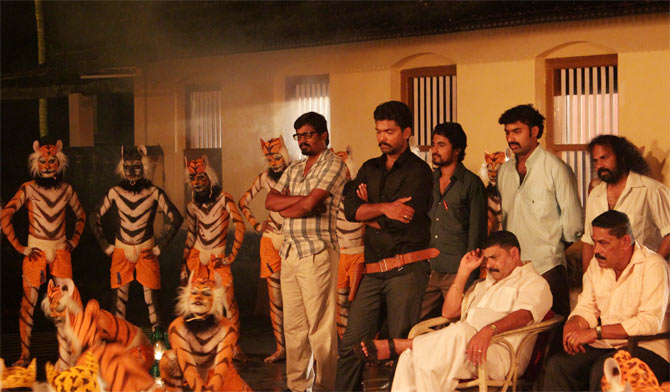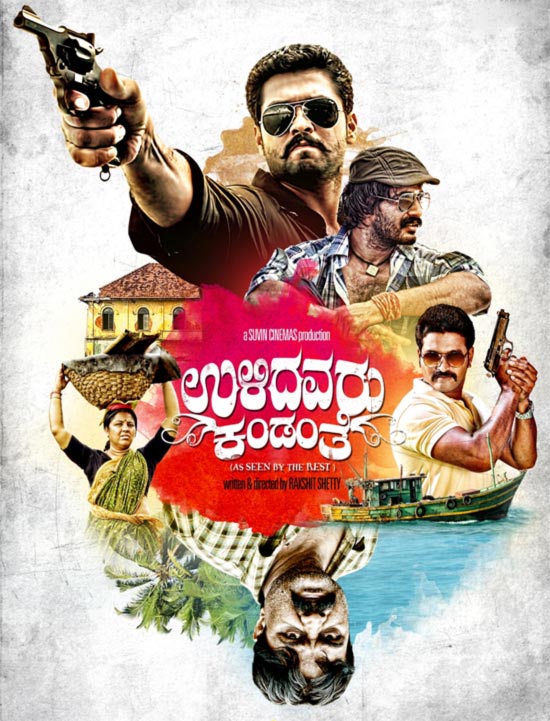 | « Back to article | Print this article |
'Ulidavaru Kandanthe is about five stories that are interlinked'
Rakshit Shetty’s claim to fame as an actor was the much talked about Kannada film, Simplag Ondu Love Story, which was a breath of fresh air in Kannada cinema early this year.
He will be making his debut as a writer-director with Ulidavaru Kandanthe (As seen by the rest). Within just four days of its launch, its trailer on Youtube went viral.
Rakshit talks to rediff about his debut as a director and the current state of Kannada cinema.
The trailer of Ulidavaru Kandanthe has gone viral. It’s not the kind of cinema that one would expect from the Kannada film industry and has pleasantly shocked viewers on social media platforms.
The response has been amazing and we are really excited. A line from the trailer, ‘Shoot maadbeka’ (Do you want to be shot?!) has become a catch phrase among the youth.
We are planning to make T-shirts with that catch phrase for promotion, but without the title of the film. We don’t want in-your-face kind of marketing (laughs). Just the catch lines from different characters on the T-shirts.
'I have grown up watching Quentin Tarantino'
Why is the trailer four minutes long?
It’s long, yes, but keeping in mind the content of my film, and choosing the bits that would attract the audience, and keeping it engaging, this is the shortest trailer we could come up with.
Ulidavaru Kandanthe is about five stories that are interlinked. For the theatrical trailer, we have a two-and-a-half minute cut and when I look at it, I feel I have compromised on that. But I cannot have a theatrical trailer that runs four minutes long.
On social media networks, I have no restriction, so we decided to go ahead with a long trailer and we are very thrilled with the response.
After watching the trailer it looks like you are a big fan of Quentin Tarantino and Guy Ritchie.
I have grown up watching Tarantino. I like his style and I guess that reflects in the way I have shot the film and cut the trailer.
But I never had Guy Ritchie in mind when filming or cutting the trailer. Viewers may feel that way because it is about having multiple characters who are after something. But there’s nothing more to it.
'I never thought that I would become a director'
Ulidavaru Kandanthe is likely to take you into the big league of filmmakers in Karnataka. How did you take the plunge from the corporate world into Kannada films?
I am from Udupi in coastal Karnataka. I was fascinated by films and my brother used to bring home video cassettes of movies and we used to watch them with so much awe as kids.
My parents had nothing to do with films or the media world and I never thought even once that one day I would end up here.
After my engineering I came to Bangalore looking for work. I started reading more books, watching more world cinema and also networked with short filmmakers and assistant directors on social media platforms.
Slowly I graduated to doing theatre, short films and such. And then Namm Areadalondina and Tuglak happened but without much success.
Simplag Ondu Love Story brought me into the limelight.
You said Ulidavaru Kandanthe is about five stories linked by a common thread. Are you attempting a Roshomon in Tarantino style in Kannada language?
When it comes to perspectives, there are lots of films made post Roshomon across the world. Even in Kannada, the late Puttana Kanagal has attempted such a style of narrative with Katha Sangama, which had Rajinikanth.
Roshomon is one story with different versions. Mine is a film with different chapters, an anthology or portmanteau film as they call it, where five stories are connected to one incident that happens on Sri Krishna Janmashtami day in Udupi during the early 1990s and the repercussions that follow that particular incident, and they do not culminate at the climax.
'There are lots of hidden meanings and metaphors in the film'
Your film is set in Udupi. In Tamil Nadu and Kerala, filmmakers set their film in the town or district they come from. We do not see that trend in Karnataka.
Gulabi Talkies or Kanasina Kudremeleri did depict coastal Karnataka and Kundapura, but like you rightly said, not much has been attempted in the mainstream Kannada cinema.
Our own language dialects, culture and flavour remain unknown to our own audience most times. It is a major concern and it needs to be addressed.
In the trailer, I have showcased the tiger dance during the Janmashtami festival in Udupi. Kids paint their faces like a tiger, wear folk costumes and go around collecting money to celebrate the festival in the temple town.
One character in my film is based on a guy who paints himself like a tiger and one story is fully based on him.
There are lots of hidden meanings and metaphors in the film and people will interpret them in their own way as they watch it.
You have shot Ulidavaru Kandanthe entirely in Sync sound. This is the first Kannada film to be shot with that technology.
Yes. We actually have very few location sound engineers in south India. I wanted someone who could give me a lot of their time.
I got in touch with Renjith Vishwanathan. He designed the sound for all the songs too. This will be his first film as an on-location sound guy. It was a very good experience. He was very enthusiastic.
'There was always an audience for good Kannada cinema'
Tell us something about your style of shooting and editing. Five stories in one film would have been a challenge.
We shot all the stories in different styles. Every chapter has been treated differently, some of them in hand held, some in steady cam, and some just mounted on a tripod with just block shots, and we tried to play around with different tones.
Having said that, we had to maintain uniformity as it is just one film. In Richie’s chapter, for example, where I play Richie, we had to give it a western touch, like a cowboy. There is a logical Indian reason for that which you will know when you watch the film.
Would you like to make films in other languages as well?
Of course! As a director, I would like to make films in any language I am comfortable with. Hindi or some day even Tulu!
As an actor I would like to work with Anurag Kashyap, for example.
Things are looking bright for Kannada cinema. Lucia, Jatta and now your Ulidavaru Kandanthe…
Exactly! There was always an audience for good Kannada cinema in Karnataka. They have been neglected for a long time now. They moved away to watching other language films out of frustration.
